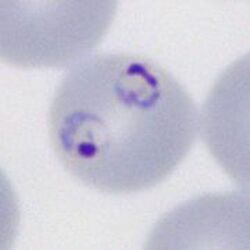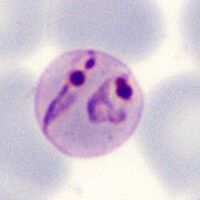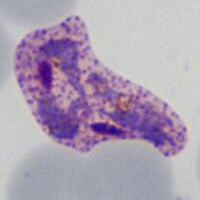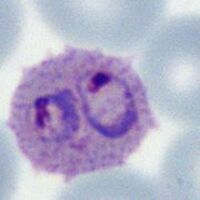Multiple parasites: Difference between revisions
From haematologyetc.co.uk
No edit summary |
No edit summary |
||
| (15 intermediate revisions by 2 users not shown) | |||
| Line 1: | Line 1: | ||
---- | ---- | ||
''' | '''Navigation'''</br> | ||
[[Plasmodium falciparum: Morphology|Go Back]] | |||
---- | |||
{| class="wikitable" style="border-style: solid; border-width: 4px; color:black" | |||
|colspan="1" style = "font-size:100%; color:black; background: FFFAFA"|<span style="color:navy>'''What are double infected cells?'''</span> | |||
In some cases more than one parasite (most often early or late trophozoites) can be seen within a single erythrocyte. This is surprisingly frequent suggesting some red cells are ore attractive to parasites, or that already infected cells are more susceptible. | |||
<gallery mode="nolines" widths=250px heights=250px> | |||
File:11multiple1.jpg|link={{filepath:11multiple1.jpg}} | |||
</gallery> | |||
<span style="font-size:80%">The most frequent form - two early trophozoites of ''P.falciparum'' in a single erythrocyte</span> | |||
<br clear=all> | |||
---- | ---- | ||
''' | <span style="color:navy>'''Species significance'''</span> | ||
Most often considered a feature indicating ''P.falciparum'' infection, and is certainly frequent in that species where it can be used to support the diagnosis. However, the form should not considered as specific, and may occur in any species (and is also a frequent finding for babesia parasites). | |||
---- | ---- | ||
<span style="color:navy>'''Additional images'''</span> | |||
<gallery mode="nolines" widths=200px heights=200px> | |||
File:11multiple2.jpg|A|link={{filepath:11multiple2.jpg}} | |||
File:11multiple3.jpg|B|link={{filepath:11multiple3.jpg}} | |||
File:11multiple4.jpg|C|link={{filepath:11multiple4.jpg}} | |||
</gallery> | |||
<span style="font-size:80%">Double parasites in: late trophozoite of ''P.malaria'' (A) late trophozoite of ''P.vivax'' (B) and late trophozoite of P.ovale (C)</span> | |||
Latest revision as of 22:04, 18 March 2024
Navigation
Go Back
| What are double infected cells?
In some cases more than one parasite (most often early or late trophozoites) can be seen within a single erythrocyte. This is surprisingly frequent suggesting some red cells are ore attractive to parasites, or that already infected cells are more susceptible.
The most frequent form - two early trophozoites of P.falciparum in a single erythrocyte
Species significance Most often considered a feature indicating P.falciparum infection, and is certainly frequent in that species where it can be used to support the diagnosis. However, the form should not considered as specific, and may occur in any species (and is also a frequent finding for babesia parasites). Additional images Double parasites in: late trophozoite of P.malaria (A) late trophozoite of P.vivax (B) and late trophozoite of P.ovale (C) |



